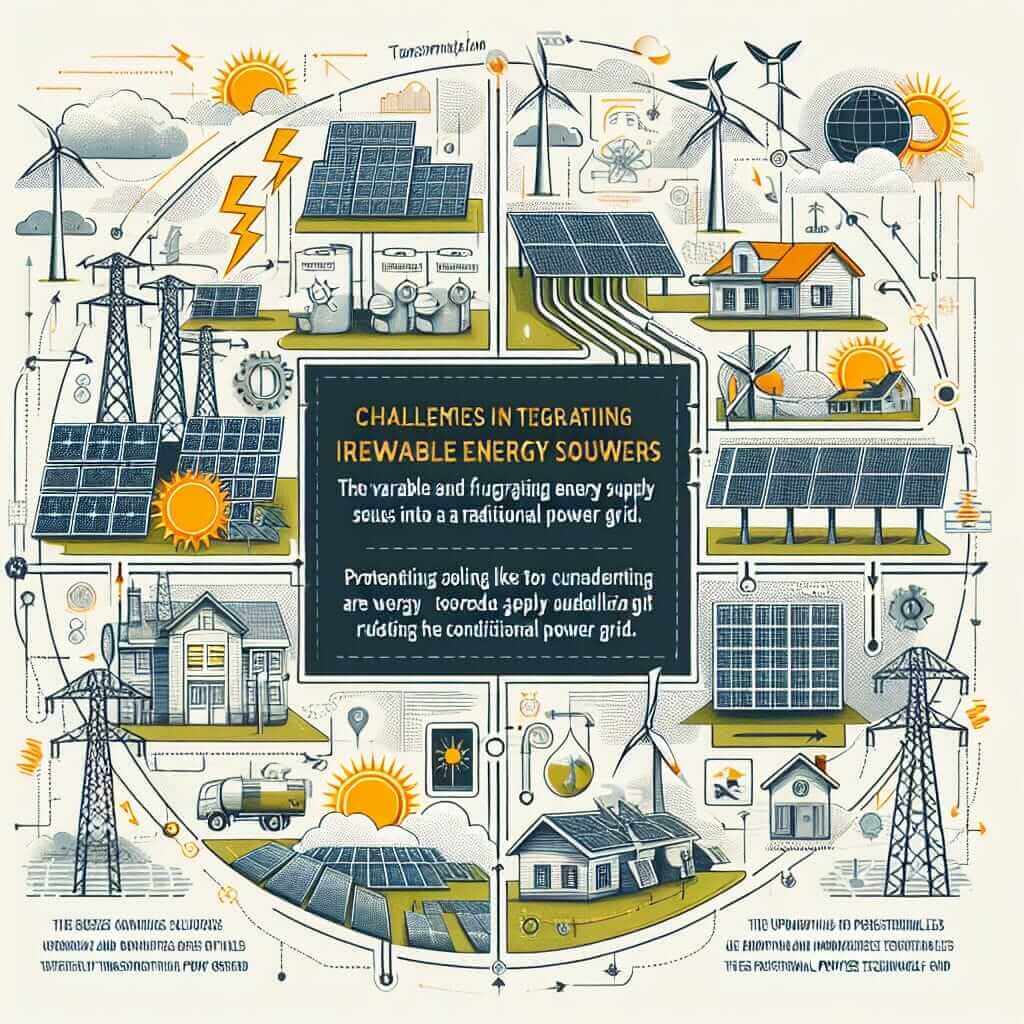The IELTS Reading section tests a candidate’s ability to understand and interpret written texts across various academic subjects. Over recent years, topics related to renewable energy, such as “Challenges in renewable energy adoption,” have become popular within the IELTS Reading exams. This reflects the increasing global focus on sustainable energy solutions and their pertinent challenges. Understanding these challenges prepares candidates not only for their exams but also deepens their knowledge of a globally significant issue.
IELTS Reading Practice: Challenges in Renewable Energy Adoption
Reading Passage
Renewable energy sources, including solar, wind, hydro, and geothermal energy, have been at the forefront of the global agenda due to their potential to mitigate climate change and reduce dependence on fossil fuels. However, the widespread adoption of renewable energy faces several challenges.
First, the initial cost of renewable energy infrastructure is significantly high. Building solar farms, wind turbines, and hydroelectric dams requires substantial investment. While the long-term benefits and savings are evident, the upfront costs can be a deterrent, especially for developing countries with limited financial resources.
Second, the intermittent nature of renewable energy sources poses a major hurdle. Solar energy relies on sunlight, which is not available at night and can be inconsistent on cloudy days. Similarly, wind energy depends on wind patterns, which can be highly variable. This intermittency necessitates the development of efficient energy storage solutions to ensure a continuous power supply. However, current storage technologies, such as batteries, are still costly and not entirely efficient.
Third, integrating renewable energy into existing power grids is challenging. Traditional power grids are designed for a steady, predictable supply of energy from fossil fuels. Introducing renewable energy into these grids requires significant modifications and advanced management systems to handle fluctuations in energy production.

Another pressing issue is the environmental impact of renewable energy projects. Although renewable energy is often touted as environmentally friendly, building large-scale projects can disrupt local ecosystems. For instance, constructing hydroelectric dams can lead to the displacement of communities and wildlife, and wind turbines have been criticized for their impact on bird populations.
Socio-political factors also play a crucial role. In many regions, the energy sector is heavily influenced by political decisions and vested interests. Transitioning to renewable energy can face resistance from stakeholders in the fossil fuel industry, who may lobby against policies that promote renewable energy.
Lastly, public perception and acceptance of renewable energy technologies can impact their adoption. Misinformation, lack of awareness, and cultural resistance can hamper efforts to promote renewable energy. Engaging communities and providing education on the benefits of renewable energy are essential steps to overcoming this barrier.
Questions
Multiple Choice
-
What is a major financial barrier to renewable energy adoption?
a. High maintenance costs
b. High initial infrastructure costs
c. Expensive raw materials
d. Excessive land use -
What is a technological challenge related to renewable energy mentioned in the passage?
a. Noise pollution
b. Energy storage inefficiency
c. Lack of sunlight
d. Limited wind resources -
According to the passage, what environmental impact can hydroelectric dams have?
a. Air pollution
b. Water contamination
c. Displacement of communities and wildlife
d. Soil erosion
True/False/Not Given
-
Renewable energy projects have no negative impact on local ecosystems.
-
Current battery technologies are both cost-efficient and highly efficient in energy storage.
-
Political decisions can significantly influence the adoption of renewable energy.
Matching Information
Match the challenges with the corresponding descriptions:
a. Intermittent energy supply
b. High initial costs
c. Grid integration issues
d. Socio-political resistance
- Requires substantial investment to establish.
- Energy generation depends on natural elements that are not constant.
- Existing power grids not readily adaptable to fluctuations.
- Opposition from those with interests in traditional energy sectors.
Answer Keys
Multiple Choice:
- b. High initial infrastructure costs
- b. Energy storage inefficiency
- c. Displacement of communities and wildlife
True/False/Not Given:
4. False
5. False
6. True
Matching Information:
7. b. High initial costs
8. a. Intermittent energy supply
9. c. Grid integration issues
10. d. Socio-political resistance
Common Mistakes in Answering
- Misinterpretation of Questions: Ensure to thoroughly read the question and understand what it’s asking before looking for the answer in the text.
- Distractors in Multiple Choice: Be wary of options that seem correct but do not answer the question fully.
- Assumptions in True/False/Not Given: Only judge based on the text provided. Do not assume information.
- Mistaking Keywords in Matching Information: Pay attention to the specific details that match each problem with the corresponding description.
Vocabulary
- Intermittent (adj) /ɪnˈtɜː.mɪ.tənt/: not continuous; happening at intervals.
- Infrastructure (n) /ˈɪn.frəˌstrʌk.tʃər/: the basic physical and organizational structures and facilities needed for the operation of a society or enterprise.
- Mitigate (v) /ˈmɪt.ɪ.ɡeɪt/: make less severe, serious, or painful.
- Ecosystem (n) /ˈiː.kəʊˌsɪs.təm/: a biological community of interacting organisms and their physical environment.
Grammar Focus
Passive Voice:
- “Traditional power grids are designed for a steady, predictable supply of energy from fossil fuels.”
Usage:
- Passive voice is used to emphasize the action or the receiver of the action rather than the doer. This construction is common in formal and academic writing.
Advice for IELTS Reading
- Practice Regularly: Consistent practice will improve your reading speed, comprehension, and ability to identify correct answers.
- Enhance Vocabulary: Work on building a strong vocabulary to understand complex texts better.
- Understand Question Types: Familiarize yourself with different types of questions (Multiple Choice, True/False/Not Given, etc.) and develop strategies for each.
- Time Management: Time yourself while practicing to ensure that you can complete sections within the given time in the actual exam.
For more related readings, check our articles on Impact of Renewable Energy on Global Economic Stability, Impact of Renewable Energy on Energy Independence, and Impact of Renewable Energy on Rural Development.